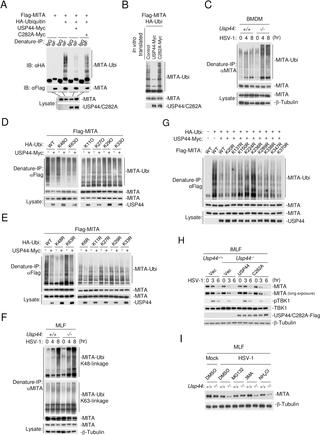当前位置:
X-MOL 学术
›
PLOS Pathog.
›
论文详情
Our official English website, www.x-mol.net, welcomes your feedback! (Note: you will need to create a separate account there.)
USP44 positively regulates innate immune response to DNA viruses through deubiquitinating MITA.
PLoS Pathogens ( IF 6.7 ) Pub Date : 2020-01-22 , DOI: 10.1371/journal.ppat.1008178 Hong-Yan Zhang 1, 2 , Bo-Wei Liao 1, 2 , Zhi-Sheng Xu 1 , Yong Ran 1 , Dong-Peng Wang 1, 2 , Yan Yang 1 , Wei-Wei Luo 1 , Yan-Yi Wang 1
PLoS Pathogens ( IF 6.7 ) Pub Date : 2020-01-22 , DOI: 10.1371/journal.ppat.1008178 Hong-Yan Zhang 1, 2 , Bo-Wei Liao 1, 2 , Zhi-Sheng Xu 1 , Yong Ran 1 , Dong-Peng Wang 1, 2 , Yan Yang 1 , Wei-Wei Luo 1 , Yan-Yi Wang 1
Affiliation

|
Mediator of IRF3 activation (MITA, also known as stimulator of interferon genes, STING) senses the second messenger cyclic GMP-AMP (cGAMP) which is synthesized upon DNA virus infection and activates innate antiviral immune response. It has been demonstrated that the activity of MITA is delicately regulated by various post-translational modifications including polyubiquitination. In this study, we identified the deubiquitinating enzyme USP44 as a positive regulator of MITA. USP44 is recruited to MITA following DNA virus infection and removes K48-linked polyubiquitin moieties from MITA at K236, therefore prevents MITA from proteasome mediated degradation. USP44-deficiency results in acceleration of HSV-1-induced degradation of MITA and reduced induction of type I interferons (IFNs) and proinflammatory cytokines. Consistently, Usp44-/- mice are more susceptible to HSV-1 infection as indicated by higher tissue viral titers, greater tissue damage and lower survival rate. These findings suggest that USP44 plays a specific and critical role in the regulation of innate immune response against DNA viruses.
中文翻译:

USP44通过去泛素化MITA积极调节对DNA病毒的先天免疫应答。
IRF3激活的介体(MITA,也称为干扰素基因的刺激物,STING)可感知第二个信使环GMP-AMP(cGAMP),该分子在DNA病毒感染后合成,并激活先天的抗病毒免疫应答。已经证明,通过多种翻译后修饰,包括多聚泛素化,可精细地调节MITA的活性。在这项研究中,我们确定了去泛素化酶USP44是MITA的正调节剂。在DNA病毒感染后,USP44被募集到MITA并在K236处从MITA去除K48连接的多聚泛素部分,因此防止MITA受到蛋白酶体介导的降解。USP44缺陷导致加速HSV-1诱导的MITA降解并减少I型干扰素(IFN)和促炎细胞因子的诱导。一致地,Usp44-/-小鼠对HSV-1感染更敏感,这表现为更高的组织病毒滴度,更大的组织损伤和更低的存活率。这些发现表明,USP44在调节针对DNA病毒的先天免疫应答中起特定而关键的作用。
更新日期:2020-01-23
中文翻译:

USP44通过去泛素化MITA积极调节对DNA病毒的先天免疫应答。
IRF3激活的介体(MITA,也称为干扰素基因的刺激物,STING)可感知第二个信使环GMP-AMP(cGAMP),该分子在DNA病毒感染后合成,并激活先天的抗病毒免疫应答。已经证明,通过多种翻译后修饰,包括多聚泛素化,可精细地调节MITA的活性。在这项研究中,我们确定了去泛素化酶USP44是MITA的正调节剂。在DNA病毒感染后,USP44被募集到MITA并在K236处从MITA去除K48连接的多聚泛素部分,因此防止MITA受到蛋白酶体介导的降解。USP44缺陷导致加速HSV-1诱导的MITA降解并减少I型干扰素(IFN)和促炎细胞因子的诱导。一致地,Usp44-/-小鼠对HSV-1感染更敏感,这表现为更高的组织病毒滴度,更大的组织损伤和更低的存活率。这些发现表明,USP44在调节针对DNA病毒的先天免疫应答中起特定而关键的作用。


























 京公网安备 11010802027423号
京公网安备 11010802027423号